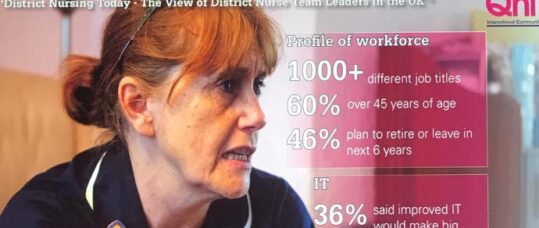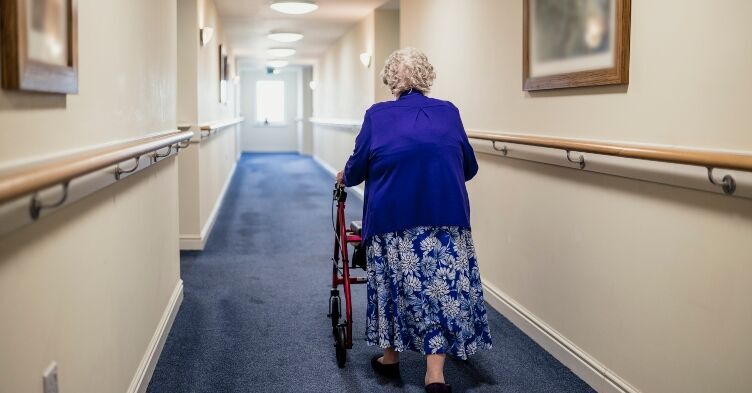Hundreds of district nurses are planning to quit amid ongoing issues over staff recruitment and retention that threaten patient safety, a new report commissioned by the Queen’s Nursing Institute (QNI) published today (19 November) has found.
The QNI highlighted ‘an ageing workforce heading for retirement’ where a majority (60%) of the 2858 district nursing team members surveyed are aged over 45 and nearly half (46%) are planning to either retire or leave in the next six years (25% to retire, 21% to leave).
The document, ‘District Nursing Today: The View of District Nurse Team Leaders in the UK’, went on to warn that long-term underinvestment in training, education and skills in district nursing paired with rising demand poses a ‘direct threat to patient safety’.
The QNI argues that a ‘fundamental misunderstanding’ of the district nurse role has contributed to its neglect as highlighted by the report, the first from its new International Community Nursing Observatory (ICNO) – launched yesterday (18 November) – that aims to better understand community nursing through data.
‘Unmanageable’ workload
The QNI said ‘unmanageable’ caseloads were exposed by the report with nearly 30% of teams (828) having caseloads between 301 and 600 and 7% (220) of teams falling into the highest caseload category of 600 plus – forcing nurses to take large amounts of unpaid overtime to do their jobs.
Nine in ten respondents regularly work some unpaid overtime every week and one-third of respondents say they work between 4-7 hours every week without pay, with most nurses (63%) saying they do not defer work or leave it undone ‘due to pressure from employers’.
But the research found that 48% of respondents said they were also forced to defer visits or delay patient care on a daily basis. As nearly a third (28%) of respondents said they had no administrative support, workload pressures are increased further because that burden will fall in clinical staff in these teams.
Lack of career development and support
Most (73%) of district nurses said they were independent prescribers, but the report found that busy or short-staffed community nursing teams often defer training and development.
The lack of training and development is prompting staff to leave the profession: of those who said they plan to quit, around one in 10 cited a lack of an annual appraisal while half complained they do not have regular clinical supervision.
Meanwhile, over a third (36%) of survey respondents said that improved information technology (IT) is one of the three most significant things that could make a difference to their work, with poor connectivity and IT infrastructure reported as the main issue among respondents.
A ‘perfect storm’
Responding to the report, Dr Crystal Oldman, chief executive of the QNI, said that ‘most people probably do not realise exactly what the daily work of a district nurse entails’.
For example, over 1000 job titles were submitted by respondents, who were asked to confirm their title with a free format submission. This variation and lack of standardisation risks a ‘limited understanding’ of community nursing among the public, which may lead to ‘unrealistic expectations’ and ‘inequitable comparisons with experiences elsewhere’, commented the report.
Dr Oldman continued: ‘[District nurses] are the key co-ordinators of multiple services and manage the treatment for complex conditions, preventing patients from needing hospital admission. They provide end of life care for the dying, and they administer a range of complex, clinical treatments at home to patients of all ages and abilities, supporting their families and carers too.’
She added that district nurses are the ‘backbone of community healthcare in this country’ and ‘provide a solution to the current crisis in acute hospital care by reducing delayed transfers of care and ensuring that patients are kept safe at home.’
The QNI is now calling on the Government to ‘intervene, in order to prevent a deeper crisis’ and invest in training, education and development of new district nurses, as well as increase research into the future capacity and capability of the district nursing workforce.
Professor Alison Leary MBE, director of the ICNO and chair of healthcare workforce modelling at London South Bank University, said that district nursing is seeing a ‘perfect storm’ with a set of circumstances that ‘threaten patient safety’ if left unattended.
She continued: ‘We need to seriously address what that crisis will look like for local communities in the future and what such a shortage of qualified district nurses will mean for people in our community with complex care needs who desperately need caring for at home.’








